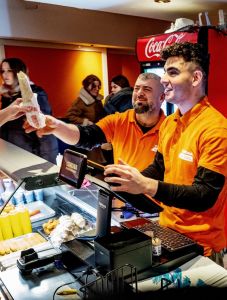Nijmegen’s most popular hangover cure: Musi’s garlic sauce
-
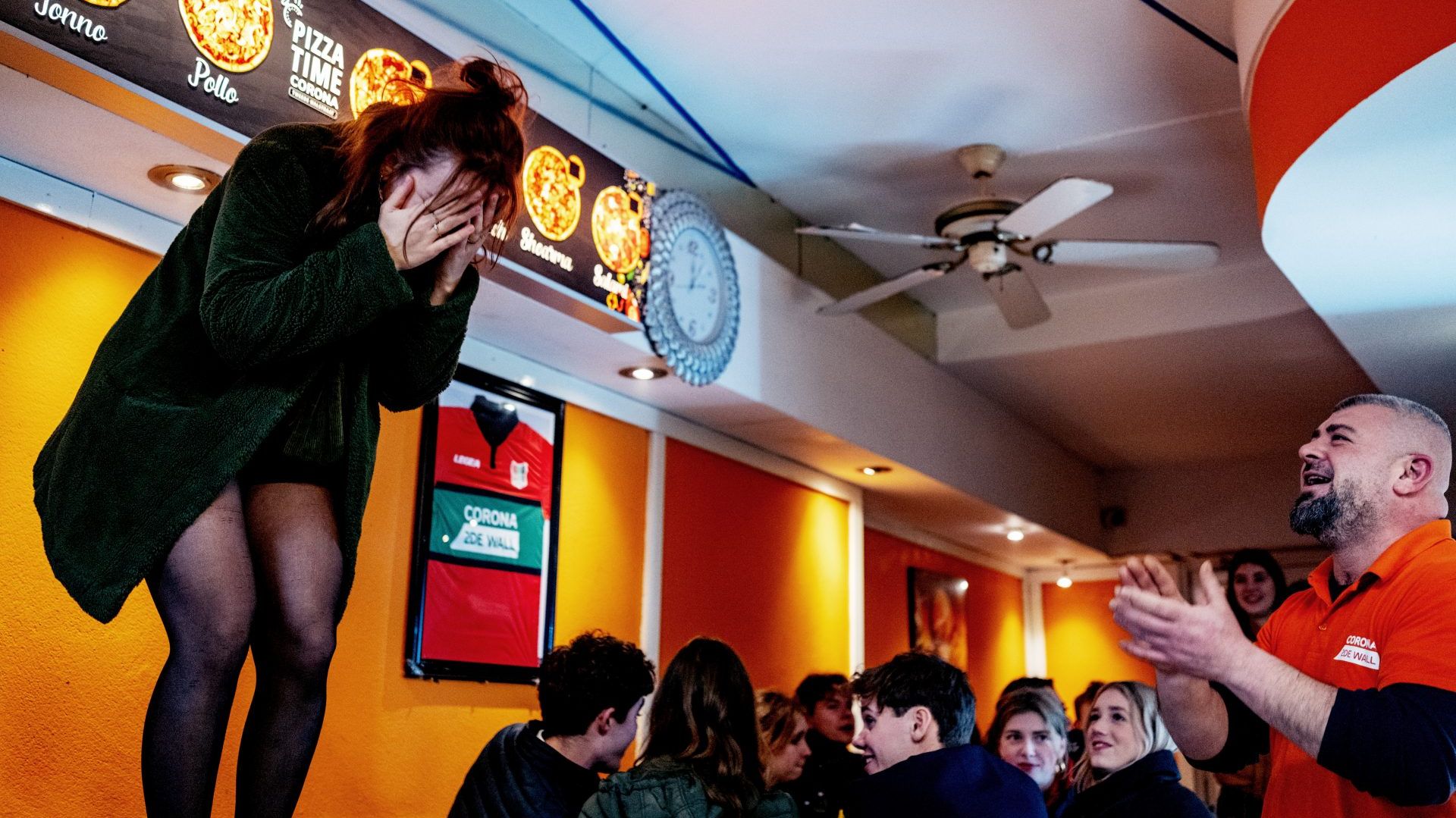 Foto: Duncan de Fey
Foto: Duncan de Fey
Cafetaria Corona is the go-to place for Nijmegen students after a night on the town; the place is absolutely crowded in the middle of the night. What is the secret of Corona at the Tweede Walstraat? Is it their famous garlic sauce? Or maybe it’s Musi’s winning smile?
‘A girl came up to me the other day, to tell me something. She confessed that, over the course of her studies in Nijmegen, she stole 25 bottles of garlic sauce from my place.’
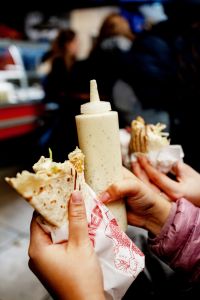
Mustafa Kadir – nicknamed Musi – tells the story with a smile on his face, while smoking a cigarette in front of his shop. On the other side of the window, inside the shop, it’s a madhouse. Musi gives a concerned glance inside as two girls fall off their chairs. They get back up, giggling. The chair is still in one piece. Musi takes another drag from his cigarette.
Of course, he knows that students have a tendency to disappear with his garlic sauce. It’s a very tasty sauce, after all. ‘Secret recipe,’ he says with a mysterious look on his face. ‘I make it myself, but I’m not going to tell you what’s in it.’
It’s half past two at night on Thursday: student night. There are lots of combinations of evening wear and sneakers trodding around because the gala of study associations Mundus (Geography, Planning, and Environment) and BOW (Public Administration) at the Waagh just ended. Girls walk in, shaking from the cold. Boys in ties drop onto the long benches under harsh lights.
‘Two dürüm döners, one kapsalon.’ Pizzas are also selling like hotcakes; they don’t serve those at other places still open at this hour. Cafetaria Corona at half past two at night is as crowded as an Ikea on the second day of Easter. But why? What is it that makes this brightly lit space so popular among students? It’s likely not due to the cozy décor ‘It’s as simple as that: students are herd animals,’ according to Hanna, a Biomedical Science student. ‘Everybody goes here. If you’ve lost someone, there’s a good chance you’ll find them here.’ Hannah is on a night out with her friend Valerie; they have just come from café De Bieb. They’re currently fishing the last few stale fries out of the plastic tub, waiting for their friends to arrive.
‘If you’ve lost someone, there’s a good chance you’ll find them at Corona’
‘I live pretty far away, at Vossenveld,’ Valerie says. ‘If I want a snack for the road, I’ll go to the Febo. But here, you can sit down and chat for a bit.’ Hanna: ‘The night’s incomplete without a visit to Corona.’
Free lolly
The music’s blaring. Mambo No. 5. A group of girls, still pumped with adrenaline, is dancing in front of the glass counter, where cheese souffles are waiting for a crispy dunk in the fryer. Corona is the end of the line. One more greasy bite to eat and then back home.
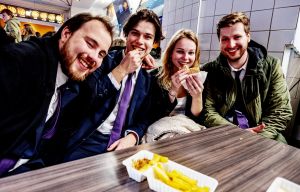
‘It helps with the hangovers,’ Sophie says. Then, she confesses: ‘I’m a familiar face here, which is honestly a little bit embarrassing. That means I come here almost all the time; sometimes twice a week.’ Sitting at a table, Sophie scarfs down a pita sandwich. Next to her, two indoor footballers from Morado are sharing some fries. People are constantly waving at each other. Hey, didn’t know I’d find you here!
All chewing heads slowly turn, when a young woman stands up on a table at the far side of the shop. ‘Happy birthday!’ Musi put on some jolly birthday song, because Fenna, a student of Pedagogical Sciences, turned 24 tonight. Hands are raised, everybody sings along. Fenna gets a free lolly.
The real secret of Corona is Musi, according to the birthday girl. Simply because Musi is a doll. A sweetheart, which is also what he calls his customers – mainly the ladies – as they walk through the door. Hey, doll. Hello, sweetheart. Nick, friend to birthday girl Fenna, shares her warm feelings for the döner boss. ‘He’s a very open, easy-going person,’ he says. ‘He always stops for a chat. People really come to this place to see him.’
Nick steps aside for some new customers shouting their orders across the room. Things are hectic at Corona’s counter. People are texting and calling. ‘Hey, I’m at the Turkish place. Come over here, man.’
Pushing and pulling
Mustafa Kadir was born in Iraq in 1986. He worked at a falafel shop until he was forced to flee the country in 2005. His flight from Iraq ended in the Netherlands. When he finally got a residence permit, he started working in Nijmegen. At first, he went from one döner place to the next, until fifteen years ago, when he took over an Egyptian grill room at the Tweede Walstraat. He learned to speak Dutch among bami snacks.
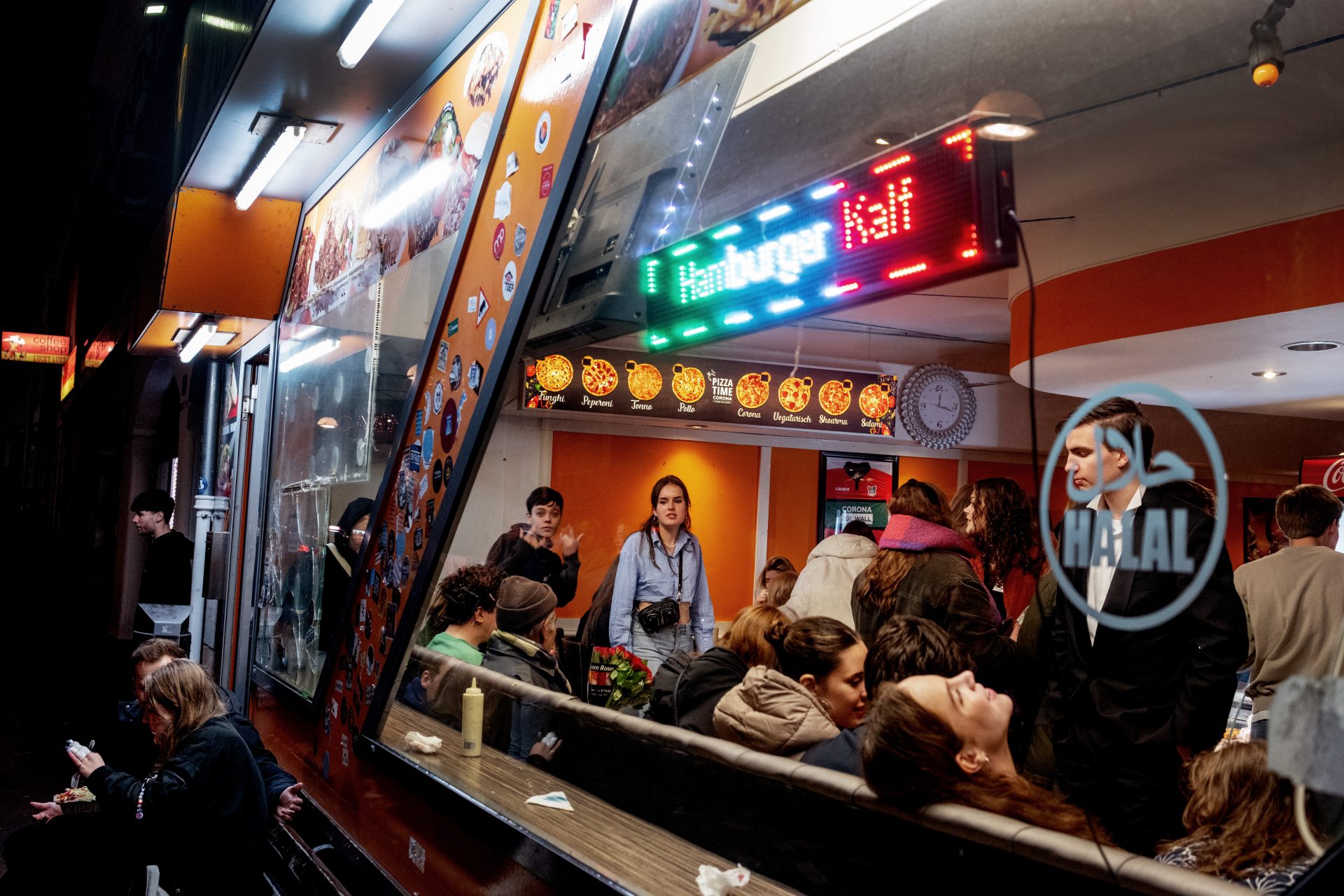
‘I run this place with my wife,’ Musi says. ‘She’s Dutch. We have three sons, ages 14, 10, and 9. Handsome boys.’ The family lives in the city centre, close to their business. Musi is in the café most weeknights; as soon as he gets home, around half past six in the morning, he goes straight to bed.
Students are his favourite customers. ‘They’re always fun to be around. I know a lot of them quite well. Not by name, because I’m bad with names. But I am very good with faces. I can recognise them anywhere, even in town, even if they graduated a long time ago.’
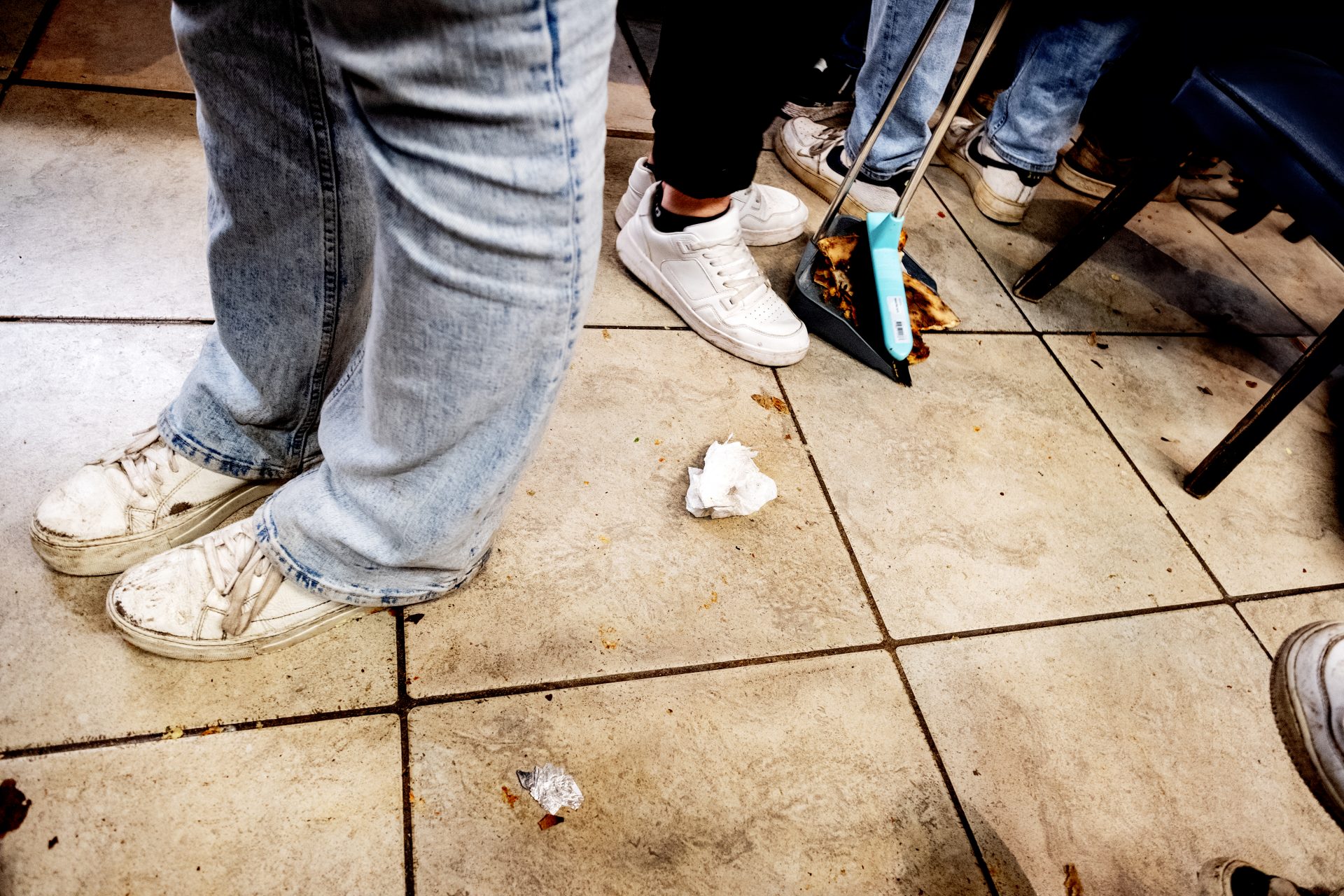
Musi likes to make his business feel like home: a small chat or two, some music, that kind of thing. Of course, sometimes there are issues. The later it gets, the drunker the people swerving across the streets. Musi prefers not to get the police involved, but sometimes he has no choice. Luckily, officers patrol right around the corner, at the start of the Molenstraat, on busy nights.
When Musi goes back behind the counter with his orange shirt-clad colleagues, there is a little trouble outside. Some pushing and pulling. Officers in yellow vests. A young customer takes his pizza margarita, drenched in the famous garlic sauce, out into the streets to watch the show. He’s a little off-balance. Once back inside, the pizza proves too heavy and drops onto the floor. The boy points at it and asks if anybody wants a slice.
Everything at the Leidseplein is closed now, according to Jennifer from Amsterdam. She’s out in Nijmegen with her friends from Phocas. ‘And we don’t have Musi,’ she adds, with a loving glance at the man raising his voice to make himself heard over the cacophony of students. ‘Pita Mika,’ he shouts. ‘PITA MIKA!’
Mika was a friendly young woman who dropped by often, and who wanted a sandwich with lots of cheese. Of course, Musi wouldn’t be Musi if he didn’t make a pita, especially for her, filled with a cheese sandwich wrapped in two slices of cheese and a bit of chilli sauce. The Pita Mika is now a menu item popular in vegetarian-friendly Nijmegen.
‘Wait, it’s already half past four?’ A young woman yells out, as she dunks a frikandel in a dollop of mayonnaise. ‘Shit, I have a lecture in four hours.’ Next to her, someone drops a bottle of garlic sauce in his pocket before disappearing into the night.
It’s not until after five in the morning that Corona begins to quiet down. As the morning looms, the lights in the students’ eyes start to dim. Their conversations become harder and harder to understand. Musi smokes one last cigarette in the Tweede Walstraat. Just a bit longer until he will be able to clean up and go home. He smiles, again. Musi had a lovely evening.
